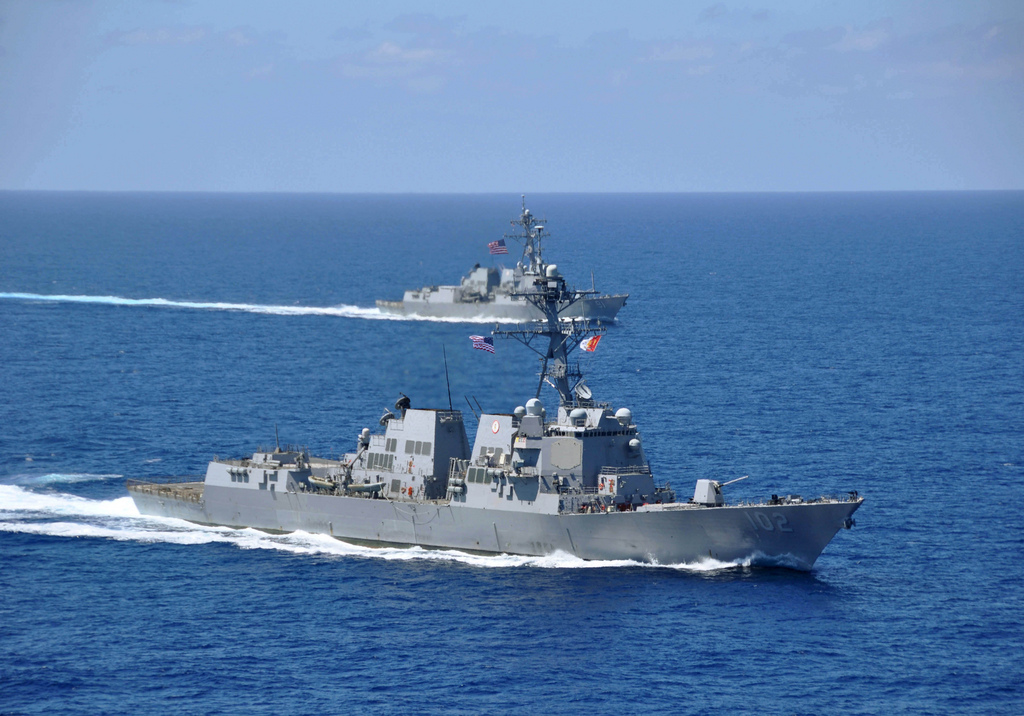 U.S. Navy photo by Mass Communication Specialist 1st Class David Mercil/Released
U.S. Navy photo by Mass Communication Specialist 1st Class David Mercil/Released
Strengthening Deterrence in the South China Sea
This past week, Chinese ships harassed and swarmed Philippine Coast Guard ships on a scientific mission in the South China Sea. Unfortunately, similar actions from China are becoming more commonplace in the contested waters of the South China Sea. China has demanded that the Philippines alerts the Chinese Communist Party (CCP) before navigating within the sea. The Philippines, which claims parts of the South China Sea as part of its exclusive economic zone (EEZ), has refused to seek another country’s approval for actions in its own territory or EEZ. Heightened tensions such as these are playing out between China and other U.S. allies near and around the South China Sea.
Maritime security in and around the South China Sea is constantly threatened by the Chinese government’s aggressive actions in the region. China consistently uses its large navy and coast guard to harass and intimidate neighboring states. The United States’ presence in the area keeps greater Chinese aggression at bay. Stability and security in the South China Sea are important to the U.S. because it is a major trade fairway, an important economic zone for many of its allies, and a key component of the greater Indo-Pacific region. The U.S. commits billions of dollars and countless resources to support the region and its allies there, as seen in the FY2024 National Defense Authorization Act (NDAA), which authorized over $14 billion towards the Pacific Deterrence Initiative. Additionally, the U.S. partners with Japan, Australia, Indonesia, and other countries in the region and provides resources to support their security structure and defense abilities.
U.S. power in the Indo-Pacific is vital to deterring conflict with China, but it is not the only military deterrent in the area. U.S. allies in the region can also act as a deterrent against China by strengthening their own military and defense programs, extending greater support to each other, and displaying outward commitment to maintaining peace. Recent years and months have shown increases in defense spending from and security partnerships between NATO countries in response to Russia’s war in Ukraine. These changes satisfy a long-held request by U.S. presidents for their NATO allies to contribute more to their own defense and not rely entirely on U.S. resources. Similar changes are necessary in the Indo-Pacific to successfully deter further Chinese actions.
Japan and the Philippines currently exemplify one positive change in this direction. In May 2024, the two countries announced phase three of the Maritime Safety Capability Improvement Project (MSCIP). The MSCIP aims to increase the abilities of the Philippines Coast Guard (PCG) to provide maritime security for the country and region. For phase three, Japan agreed to fund and construct five new multi-mission response vessels. The new vessels will supplement the two other ships Japan built for the Philippines in 2022 for phase two of MSCIP. The two countries are also working toward signing the Reciprocal Access Agreement to allow for greater cooperation through joint trainings and exercises. Both initiatives draw the two countries closer and increase the security of the area.
Japan and the Philippines benefit from enhanced security cooperation, specifically in maritime security issues. China’s Coast Guard and Navy overwhelm PCG vessels in the South China Sea, and it needs support from Japan and other nations to counter China. Japan has its own disputes with China over islands and needs stronger neighbors to assist in keeping China at bay and maintaining sovereignty in its waters. The U.S. and its allies also benefit from this relationship—as collective defenses rise, so too does the ability to deter China.
The United States needs to begin outwardly signaling and calling for more defense responsibility from its partners and allies in the Indo-Pacific. This dialogue can come from the president in meetings with other heads of state. The secretary of state, along with ambassadors and diplomats, can bring this request to summits in Indo-Pacific countries. U.S. leaders should also publicly praise and highlight countries as they choose to act and highlight the benefits their actions bring to the region. This rhetoric does not signal a U.S. desire to back away from the region or a security weakness. Instead, it encourages more allied security partnerships and personal responsibility for national defense programs to strengthen the deterrent against further escalation and conflict with China.
Strong allies are key to U.S. national security and successful foreign policy. The United States needs its allies to step up and help secure the stability of the South China Sea and the entire Indo-Pacific region.






